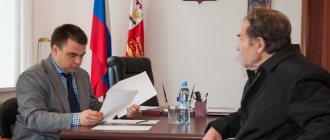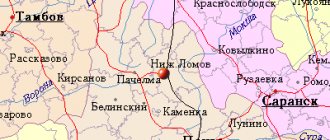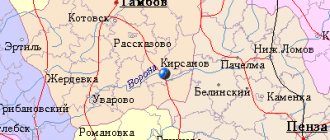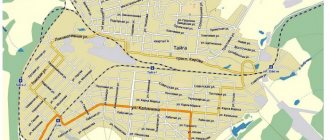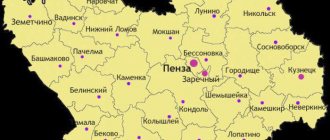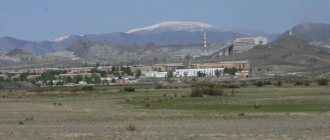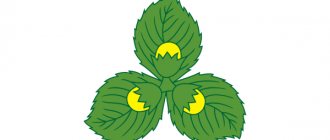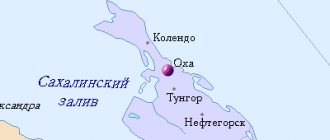The word "Belinsky" has other meanings: see Belinsky (meanings).
For the term "Chembar" see also other meanings.
| City Belinsky Flag | Coat of arms |
| A country | Russia, Russia |
| Subject of the federation | Penza regionPenza region |
| Municipal district | Belinsky |
| urban settlement | Belinsky city |
| Coordinates | 52°58′00″ n. w. 43°25′00″ E. long / 52.96667° north w. 43.41667° E. d. / 52.96667; 43.41667 (G) [www.openstreetmap.org/?mlat=52.96667&mlon=43.41667&zoom=12 (O)] (Z)Coordinates: 52°58′00″ N. w. 43°25′00″ E. long / 52.96667° north w. 43.41667° E. d. / 52.96667; 43.41667 (G) [www.openstreetmap.org/?mlat=52.96667&mlon=43.41667&zoom=12 (O)] (I) |
| First mention | 1708 |
| Former names | until 1948 - Chembar |
| City with | 1780 |
| Population | ↘7971[1] people (2016) |
| Names of residents | Belinians, Belinets |
| Timezone | UTC+3 |
| Telephone code | +7 84153 |
| Vehicle code | 58 |
| OKATO code | [classif.spb.ru/classificators/view/okt.php?st=A&kr=1&kod=56212501 56 212 501] |
| Official site | [gbelinsk.belinskij.pnzreg.ru k.belinskij.pnzreg.ru] |
| Belinsky Moscow |
| Penza Belinsky |
Belinsky
(until 1948
Chembar
) is a city in the Penza region of Russia, the administrative center of the Belinsky district.
Story
Founded at the beginning of the 18th century. The first mention dates back to 1723 in the revision tale of the yasak peasant Ivan Slepov[2]. Until 1780 it was called: “the village of Nikolskoye, Maly Chenbar also.”
In 1780 it was transformed into the county town of Chembar of the Chembar county of the Penza governorship, in 1798 it was abolished, and in 1801 it was again a county town of the Penza province. Memorable events in the life of the townspeople were the visits to Chembar by Emperor Alexander I (1824) and Nicholas I (1836).
At the end of the 19th century, there were 5 churches, 6 educational institutions, and 11 small factories and factories in Chembar, including 8 brick factories. In 1901, a paid library named after. Belinsky. In 1914 the People's House named after. Belinsky with funds raised through all-Russian subscription.
Writers M.E. Saltykov-Shchedrin, I.I. Lazhechnikov visited Chembar, P.I. Zamoysky (Zevalkin), artist L.M. Zhemchuzhnikov, state. activist M. M. Speransky. N. A. Ishutin studied at the district school.
Since 1928, Chembar has been the center of the Chembarsky district of the Penza district of the Middle Volga region, and since 1929 - of the Middle Volga region, since 1937 - as part of the Tambov region, since 1939 - in the Penza region.
During the Great Patriotic War, courses for military specialties (radio operators, nurses) were held in Chembar.
In 1948, Chembar was renamed Belinsky in honor of the literary critic and publicist Vissarion Belinsky (1811-1848), whose childhood years (from 1816 to 1829) were spent in Chembar. The last time Belinsky came to Chembar was in 1830.
Belinsky
(Penza region)
OKATO code:
56212501
Founded:
1713
City since:
1780 City of district subordination (Belinsky district of the Penza region)
Center:
Belinsky district
The city was formerly called:
| Chembar | 1780 | 1948 |
| Telephone code (reference phone) | |
| 84153***** | 21-3-33 |
Deviation from Moscow time, hours:
0
Geographic latitude:
52°58′
Geographic longitude:
43°25′
Altitude above sea level, meters:
190 Sunrise and sunset times in the city of Belinsky
Modernity
Currently, in Belinsky there are: (produces electronic components in small quantities), a food processing plant with outdated equipment (bought by St. Petersburg businessmen, produces confectionery).
The city has partially preserved the regular buildings of the late 18th century. On the main street there is a wooden house of the Belinskys, former buildings of government offices and a district school in the style of classicism (1st quarter of the 19th century). City park (was founded in the 1820s). The museum-estate of V. G. Belinsky was founded in 1938 with the participation of N. K. Krupskaya). In the Belinsky house, the building of the district school and in the house of the merchant Antyushin (literary exhibition) books, engravings of the 1st half of the 19th century, correspondence of Belinsky, etc. are stored.
Since 2008, the [www.belinskij.kupec.cz Foundation for the Promotion of Russian Culture] has been operating. Bust of Belinsky by E. V. Vuchetich. Monuments to Belinsky.
Pedagogical school (now a college), which was graduated in 1988 by Vyacheslav Viktorovich Nefyodov, candidate of historical sciences, vice-president of the Foundation for the Promotion of Russian Culture (Moscow).
Orthodox Church. 2 high schools. 2 communications companies. Stadium. District hospital. Sports and recreation complex. Pool.
17 km northeast of Belinsky, in the village of Lermontovo, there is the estate “Tarkhany” of E. A. Arsenyeva, the grandmother of M. Yu. Lermontov (museum and grave of the poet).
Chembar in fiction
The city of Chembar-Belinsky is repeatedly mentioned in the memoirs of the Russian writer I. I. Lazhechnikov, in the collection “V. G. Belinsky in the memoirs of his contemporaries" and memoirs of Soviet authors I. L. Andronikov, P. I. Zamoysky, I. G. Erenburg, G. V. Myasnikov ("Pages from the Diary"). In Lermontov's poem "Circassians" "Chembar behind the oak" is mentioned. His grandmother, E. A. Arsenyeva, repeatedly mentioned the city in private correspondence. Chembar is also noted in the story by Yu. A. Kuznetsov (Arbekov) “District History” (magazine “Sura”, No. 5, 2011).
Distances to the nearest settlements
Distances in km on the map (in brackets along roads) + direction.
- Bashmakovo 37 () NW.
- Pachelma 41 () S.
- Gavrilovka Second (Tambov region) 44 () Z.
- Tamala 48 () Yu.
- Kamenka 48 (51) NE.
- Umet (Tambov region) 53 () SW.
- Kirsanov 57 (86) SW.
- Bekovo 59 () Yu.
- Nizhny Lomov 65 (104) S.
- Serdobsk 77 (140) SE.
- Zemetchino 79 () NW.
- Kolyshley 80 () V.
- Vadinsk 83 () S.
- Rtishchevo 83 (111) Yu.
- Pichaevo (Tambov region) 86 () Z.
- Bondari (Tambov region) 90 () Z.
- Mokshan 95 () SV.
- Inzhavino (Tambov region) 95 () SW.
- Narovchat 103 () S.
- Turki (Saratov region) 108 () Yu.
- Rasskazovo 108 (131) Z.
- Spassk 108 (162) S.
- Penza 109 (123) V.
- Kondol 110 () V.
- Bessonovka 114 () V.
- Arkadak 115 (156) Yu.
- Malaya Serdoba 117 () SE.
- Insar 118 (265) SV.
- Ekaterinivka (Saratov region) 119 () SE.
- Morshansk 120 (241) SZ.
Notes
- ↑ 12
www.gks.ru/free_doc/doc_2016/bul_dr/mun_obr2016.rar Population of the Russian Federation by municipalities as of January 1, 2021 - [www.suslony.ru/Penzagebiet/belinsk.htm Poluboyarov M. S.
“G. Belinsky." //On the website “The Entire Penza Region”] - ↑ 123
[www.suslony.ru/Penzagebiet/belinsk.htm On the portal “Suslony”]. [www.webcitation.org/65C0ZrfU1 Archived from the original on February 4, 2012]. - ↑ 12345678910111213
[www.MojGorod.ru/penzenk_obl/belinskij/index.html People's encyclopedia “My City”. Belinsky (city)]. Retrieved June 18, 2014. [www.webcitation.org6QPtP7wRl/ Archived from the original on June 18, 2014]. - [demoscope.ru/weekly/ssp/rus_gub_97.php?reg=30 Demoscope Weekly. The first general population census of the Russian Empire in 1897. Current population in the provinces, districts, cities of the Russian Empire (without Finland)]. [www.webcitation.org/65BToCjFs Archived from the original on February 3, 2012].
- [demoscope.ru/weekly/ssp/rus59_reg2.php All-Union Population Census of 1959. The size of the urban population of the RSFSR, its territorial units, urban settlements and urban areas by gender] (Russian). Demoscope Weekly. Retrieved September 25, 2013. [www.webcitation.org/6GDOghWC9 Archived from the original on April 28, 2013].
- [demoscope.ru/weekly/ssp/rus70_reg2.php All-Union Population Census of 1970 The size of the urban population of the RSFSR, its territorial units, urban settlements and urban areas by gender.] (Russian). Demoscope Weekly. Retrieved September 25, 2013. [www.webcitation.org/6GDOiMstp Archived from the original on April 28, 2013].
- [demoscope.ru/weekly/ssp/rus79_reg2.php All-Union Population Census of 1979 The size of the urban population of the RSFSR, its territorial units, urban settlements and urban areas by gender.] (Russian). Demoscope Weekly. Retrieved September 25, 2013. [www.webcitation.org/6GDOjhZ5L Archived from the original on April 28, 2013].
- [demoscope.ru/weekly/ssp/rus89_reg2.php All-Union Population Census of 1989. Urban population]. [www.webcitation.org/617x0o0Pa Archived from the original on August 22, 2011].
- [www.perepis2002.ru/ct/doc/1_TOM_01_04.xls All-Russian Population Census 2002. Volume. 1, table 4. Population of Russia, federal districts, constituent entities of the Russian Federation, districts, urban settlements, rural settlements - regional centers and rural settlements with a population of 3 thousand or more]. [www.webcitation.org/65AdCU0q3 Archived from the original on February 3, 2012].
- [www.gks.ru/bgd/regl/B09_109/IssWWW.exe/Stg/d01/tabl-21-09.xls Number of permanent population of the Russian Federation by cities, urban-type settlements and districts as of January 1, 2009]. Retrieved January 2, 2014. [www.webcitation.org/6MJmu0z1u Archived from the original on January 2, 2014].
- [pnz.gks.ru/wps/wcm/connect/rosstat_ts/pnz/resources/a7ab670042a64713a4f3ad86540d86a5/Volume+1+Number+and+location+of+the+population+of the+Penza+region.pdf All-Russian Population Census 2010. Number and distribution of the population of the Penza region]. Retrieved July 20, 2014. [www.webcitation.org/6RCqnCaVO Archived from the original on July 20, 2014].
- www.gks.ru/dbscripts/munst/munst56/DBInet.cgi?pl=8112027 Penza region. Estimated resident population as of January 1, 2009-2014
- [www.gks.ru/free_doc/doc_2012/bul_dr/mun_obr2012.rar Population of the Russian Federation by municipalities. Table 35. Estimated resident population as of January 1, 2012]. Retrieved May 31, 2014. [www.webcitation.org/6PyOWbdMc Archived from the original on May 31, 2014].
- [www.gks.ru/free_doc/doc_2013/bul_dr/mun_obr2013.rar Population of the Russian Federation by municipalities as of January 1, 2013. - M.: Federal State Statistics Service Rosstat, 2013. - 528 p. (Table 33. Population of urban districts, municipal districts, urban and rural settlements, urban settlements, rural settlements)]. Retrieved November 16, 2013. [www.webcitation.org/6LAdCWSxH Archived from the original on November 16, 2013].
- [www.gks.ru/free_doc/doc_2014/bul_dr/mun_obr2014.rar Table 33. Population of the Russian Federation by municipalities as of January 1, 2014]. Retrieved August 2, 2014. [www.webcitation.org/6RWqP50QK Archived from the original on August 2, 2014].
- [www.gks.ru/free_doc/doc_2015/bul_dr/mun_obr2015.rar Population of the Russian Federation by municipalities as of January 1, 2015]. Retrieved August 6, 2015. [www.webcitation.org/6aaNzOlFO Archived from the original on August 6, 2015].
- taking into account the cities of Crimea
- [www.gks.ru/free_doc/doc_2016/bul_dr/mun_obr2016.rar Population of the Russian Federation by municipalities as of January 1, 2021. Table “31. Population of cities and towns by federal districts and constituent entities of the Russian Federation as of January 1, 2021.” RAR archive (1.0 MB)]
- [penza.rfn.ru/rnews.html?id=118838 A monument to soldiers who died in local conflicts was unveiled in Belinsky]
Population
| Population | |||||||||||
| 1790 | 1856 | 1897 | 1913 | 1926 | 1931 | 1939 | 1959 | 1970 | 1979 | 1989 | 1992 |
| 1200 | ↗4100 | ↗5345 | ↗6800 | ↘5869 | ↘5000 | ↗6006 | ↗6063 | ↗6805 | ↗7810 | ↗9028 | ↗9400 |
| 1996 | 1998 | 2000 | 2001 | 2002 | 2003 | 2005 | 2006 | 2007 | 2008 | 2009 | 2010 |
| ↗9600 | →9600 | ↗9700 | →9700 | ↘8837 | ↘8800 | →8800 | →8800 | →8800 | ↗9000 | ↗9006 | ↘8565 |
| 2011 | 2012 | 2013 | 2014 | 2015 | 2016 | 2017 | 2018 | ||||
| ↘8521 | ↘8492 | ↘8413 | ↘8323 | ↘8151 | ↘7971 | ↘7843 | ↘7694 | ||||
As of January 1, 2021, the city ranked 1006th out of 1113 cities in the Russian Federation in terms of population.
An excerpt characterizing Belinsky (city)
“I can’t, general, and that’s why I can’t because the law is stronger than me,” said the sovereign and raised his foot in the stirrup. The general bowed his head respectfully, the sovereign sat down and galloped down the street. Rostov, beside himself with delight, ran after him with the crowd. On the square where the sovereign went, a battalion of Preobrazhensky soldiers stood face to face on the right, and a battalion of the French Guard in bearskin hats on the left. While the sovereign was approaching one flank of the battalions, which were on guard duty, another crowd of horsemen jumped up to the opposite flank and ahead of them Rostov recognized Napoleon. It couldn't be anyone else. He rode at a gallop in a small hat, with a St. Andrew's ribbon over his shoulder, in a blue uniform open over a white camisole, on an unusually thoroughbred Arabian gray horse, on a crimson, gold embroidered saddle cloth. Having approached Alexander, he raised his hat and with this movement, Rostov’s cavalry eye could not help but notice that Napoleon was sitting poorly and not firmly on his horse. The battalions shouted: Hurray and Vive l'Empereur! [Long live the Emperor!] Napoleon said something to Alexander. Both emperors dismounted from their horses and took each other's hands. There was an unpleasantly false smile on Napoleon's face. Alexander said something to him with a gentle expression. Rostov, without taking his eyes off, despite the trampling of the horses of the French gendarmes besieging the crowd, followed every move of Emperor Alexander and Bonaparte. He was struck as a surprise by the fact that Alexander behaved as an equal with Bonaparte, and that Bonaparte was completely free, as if this closeness with the sovereign was natural and familiar to him, as an equal, he treated the Russian Tsar. Alexander and Napoleon with a long tail of their retinue approached the right flank of the Preobrazhensky battalion, directly towards the crowd that stood there. The crowd suddenly found itself so close to the emperors that Rostov, who was standing in the front rows, became afraid that they would recognize him. “Sire, je vous demande la permission de donner la legion d'honneur au plus brave de vos soldats, [Sire, I ask your permission to give the Order of the Legion of Honor to the bravest of your soldiers,” said a sharp, precise voice, finishing each letter . This was said by the short Bonaparte, looking directly into Alexander’s eyes from below. Alexander listened carefully to what was said to him, and bowing his head, smiled pleasantly. “A celui qui s'est le plus vaillament conduit dans cette derieniere guerre, [To the one who showed himself bravest during the war," added Napoleon, emphasizing each syllable, with a calm and confidence outrageous for Rostov, looking around the ranks of Russians stretched out in front of there are soldiers, keeping everything on guard and motionlessly looking into the face of their emperor. – Votre majeste me permettra t elle de demander l'avis du colonel? [Your Majesty will allow me to ask the colonel’s opinion?] - said Alexander and took several hasty steps towards Prince Kozlovsky, the battalion commander. Meanwhile, Bonaparte began to remove the glove from his white, small hand and, tearing it, threw it away. The adjutant, hastily rushing forward from behind, picked her up. - Who should I give it to? – Emperor Alexander asked Kozlovsky not loudly, in Russian. - Whom do you order, Your Majesty? “The Emperor frowned with displeasure and, looking around, said: “But you have to answer him.” Kozlovsky looked back at the ranks with a decisive look and in this glance captured Rostov as well. “Isn’t it me?” thought Rostov. - Lazarev! – the colonel commanded with a frown; and the first-ranked soldier, Lazarev, smartly stepped forward. -Where are you going? Stop here! - voices whispered to Lazarev, who did not know where to go. Lazarev stopped, looked sideways at the colonel in fear, and his face trembled, as happens with soldiers called to the front. Napoleon slightly turned his head back and pulled back his small chubby hand, as if wanting to take something. The faces of his retinue, having guessed at that very second what was going on, began to fuss, whisper, passing something on to one another, and the page, the same one whom Rostov saw yesterday at Boris’s, ran forward and respectfully bent over the outstretched hand and did not make her wait either one second, he put an order on a red ribbon into it. Napoleon, without looking, clenched two fingers. The Order found itself between them. Napoleon approached Lazarev, who, rolling his eyes, stubbornly continued to look only at his sovereign, and looked back at Emperor Alexander, thereby showing that what he was doing now, he was doing for his ally. A small white hand with an order touched the button of soldier Lazarev. It was as if Napoleon knew that in order for this soldier to be happy, rewarded and distinguished from everyone else in the world forever, it was only necessary for him, Napoleon’s hand, to be worthy of touching the soldier’s chest. Napoleon just put the cross to Lazarev's chest and, letting go of his hand, turned to Alexander, as if he knew that the cross should stick to Lazarev's chest. The cross really stuck. Helpful Russian and French hands instantly picked up the cross and attached it to the uniform. Lazarev looked gloomily at the little man with white hands, who was doing something above him, and, continuing to keep him motionless on guard, again began to look straight into Alexander’s eyes, as if he was asking Alexander: whether he should still stand, or whether they would order him should I go for a walk now, or maybe do something else? But he was not ordered to do anything, and he remained in this motionless state for quite a long time. The sovereigns mounted and rode away. The Preobrazhentsy, breaking up the ranks, mixed with the French guards and sat down at the tables prepared for them. Lazarev sat in a place of honor; Russian and French officers hugged him, congratulated him and shook his hands. Crowds of officers and people came up just to look at Lazarev. The roar of Russian French conversation and laughter stood in the square around the tables. Two officers with flushed faces, cheerful and happy, walked past Rostov. - What is the treat, brother? “Everything is on silver,” said one. – Have you seen Lazarev? - Saw. “Tomorrow, they say, the Preobrazhensky people will treat them.” - No, Lazarev is so lucky! 10 francs life pension. - That's the hat, guys! - shouted the Transfiguration man, putting on the shaggy Frenchman’s hat. - It’s a miracle, how good, lovely! -Have you heard the review? - the guards officer said to the other. The third day was Napoleon, France, bravoure; [Napoleon, France, courage;] yesterday Alexandre, Russie, grandeur; [Alexander, Russia, greatness;] one day our sovereign gives feedback, and the next day Napoleon. Tomorrow the Emperor will send George to the bravest of the French guards. It's impossible! I must answer in kind. Boris and his friend Zhilinsky also came to watch the Transfiguration banquet. Returning back, Boris noticed Rostov, who was standing at the corner of the house. - Rostov! Hello; “We never saw each other,” he told him, and could not resist asking him what had happened to him: Rostov’s face was so strangely gloomy and upset. “Nothing, nothing,” answered Rostov. -Will you come in? - Yes, I’ll come in. Rostov stood at the corner for a long time, looking at the feasters from afar. A painful work was going on in his mind, which he could not complete. Terrible doubts arose in my soul. Then he remembered Denisov with his changed expression, with his humility, and the whole hospital with these torn off arms and legs, with this dirt and disease. It seemed to him so vividly that he could now smell this hospital smell of a dead body that he looked around to understand where this smell could come from. Then he remembered this smug Bonaparte with his white hand, who was now the emperor, whom Emperor Alexander loves and respects. What are the torn off arms, legs, and killed people for? Then he remembered the awarded Lazarev and Denisov, punished and unforgiven. He caught himself having such strange thoughts that he was frightened by them. The smell of the food from the Preobrazhensky people and hunger brought him out of this state: he had to eat something before leaving. He went to the hotel he had seen in the morning. At the hotel he found so many people, officers, just like him, who had arrived in civilian dress, that he had to force himself to have dinner. Two officers from the same division joined him. The conversation naturally turned to peace. The officers and comrades of Rostov, like most of the army, were dissatisfied with the peace concluded after Friedland. They said that if they had held out any longer, Napoleon would have disappeared, that he had no crackers or ammunition in his troops. Nikolai ate in silence and mostly drank. He drank one or two bottles of wine. The internal work that arose in him, not being resolved, still tormented him. He was afraid to indulge in his thoughts and could not leave them. Suddenly, at the words of one of the officers that it was offensive to look at the French, Rostov began to shout with vehemence, which was not justified in any way, and therefore greatly surprised the officers.
